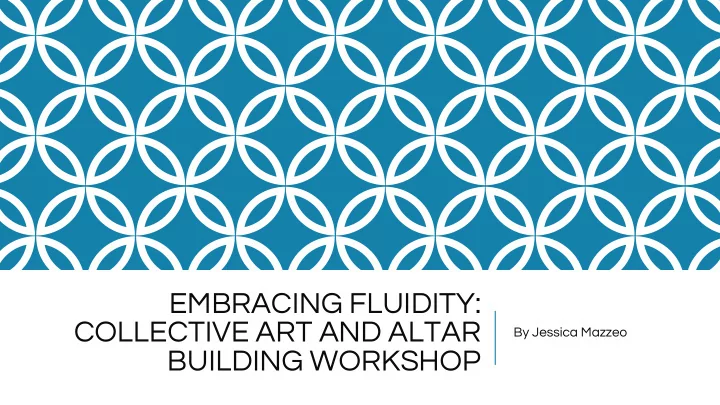

EMBRACING FLUIDITY: COLLECTIVE ART AND ALTAR By Jessica Mazzeo BUILDING WORKSHOP
The Leadership Scholars Certificate Program is a two-year selective, interdisciplinary certificate program that prepares Rutgers undergraduate women to be informed, innovative, and socially responsible leaders. Leadership Scholars design and implement social action projects to expand their understanding of issues and problems and to develop leadership skills. This project gives Scholars the opportunity to apply the theoretical knowledge they have gained about leadership, advocacy, and social change with the practical and experiential knowledge they have developed about a particular policy issue or problem through the field site placement. It also further develops leadership skills by giving undergraduates the opportunity to practice leadership through action. To find out more please visit the Institute for Women’s Leadership’s website at http://iwl.rutgers.edu.
MISSION STATEMENT Embracing Fluidity is a self-care workshop -- including meditation (mind), movement (body), and the creation of a collective altar/art installation (spirit) -- that explores and celebrates fluidity: of identity, of nature, of the universe and life itself. Goal: to create a communal space where (especially) women, femmes, non-binary, and gender non-conforming people can feel comfortable freely being/expressing themselves and self-representing outside of institutions such as school and work. Intended outcome: Attendees will feel inspired to create art/altars as therapy and ritual, enhance their self-care practices and leave with more knowledge and resources regarding holistic practices.
INSPIRATION “I take a lot of my inspiration from observing how nature and the industrial world interact. I am fascinated with the ways changes in environment affect the mind and how we move through the world. How do we exist on a day-to-day basis in a state of being pulled from, yet in a way still immersed in nature? To be fluid is to resist boxing myself in. Mixed media – such as collaging -- is my preferred outlet because it embraces multifaceted-ness. Art-making is an ongoing, ever-changing experience that allows my intuition to guide me. The altar building process is a way to reflect on what fluidity means to each person by representing it in a sensory way. Altars can be seen, touched, heard, even smelled. I usually create small altars for myself in my room, and I wanted to see how this process would play out collectively. What can we learn from each other’s interpretations, perspectives, and creations?”
INTELLECTUAL FOUNDATIONS 1.(1) Corporatization of Higher Education and the individualistic attitudes that come with it —> ways to create a more communal culture • Michel Foucault’s Discipline and Punish, 1975. • “The Corporatization of Higher Education” by Nicolaus Mills, 2012. 2.(2) Capitalism and the Commodification of Labor (Arts and Creativity) —> alternative ways of thinking/living • “Unschoolers of the World, Unwork! Grassroots Lessons and Strategies against 21st Century Capitalism” by Peter Jandric and Astra Taylor, 2016. • “Commodification of Art versus Creativity: The Antagonist Art Movement in the Expanding Arts Scene of New York City” by Michelle van Riemsdijik, 2016. 3.(3) Spirituality —> queering of feminist spirituality. • "Queering Feminist Witchcraft." Feminist Spirituality: The Next Generation by Catherine Telfod-Keough, 2009. • “Bound in the Spiral Dance: Spirituality and Technology in the Third Wave.” Feminist Spirituality: The Next Generation by Anna Mercedes and Jennifer Thweatt-Bates, 2009. 4. The workshop was a culmination of these concepts into a communal, creative, alternative space of expression.
EVENT HIGHLIGHTS
EVENT HIGHLIGHTS CONT.
CONNECTION TO WOMEN’S LEADERSHIP Subject Matter • Fluidity; of identity, nature, personality, etc. • Mirrors the various conflicting ideas that emerge when women lead • Interdisciplinary; corporatization, capitalism, arts, spirituality Planning • Non-hierarchal leadership – did not try to dominate the planning portion • Included spiritual women artists of various backgrounds • Photography, Meditation, Movement, Painting Space Creation • Safe, inclusive, non-judgmental space • Asked attendees to be co-creators of the space • Sensitive to accommodations needed
LESSONS LEARNED (1) Event planning does not have to be a one-woman job (2) Choose who you work with carefully – working with people I could rely on and who were also passionate about art/spirituality helped everything run smoothly (3) Find a balance between planning and going with the flow
LOOKING TOWARDS THE FUTURE Digital element: • Website for a feminist art collective that I am already apart of (will launch in conjunction with their projects) • Pictures from the event • Online art submissions (visual arts, writing, etc.) • Ongoing list of affordable local resources for holistic healing (farmers markets, places that sell natural body products, vegetarian/vegan food, etc.) Working with Garden of Healing: • Carla (Owner of Garden of Healing) offered to have altar art-making embedded into one of her future workshops • Asked me to create a short guide about planning Embracing Fluidity for people who want to hold events there but don’t know how to go about it.
BIBLIOGRAPHY Anapol, Deborah. “Gender Queering Mother Earth.” European Journal of Ecopsychology 3 pp. 104-108, 2012. Foucault, Michel, and Alan Sheridan. Discipline and Punish: The Birth of the Prison. pp.141-162. Vintage Books, A Division of Random House, Inc. New York. Gaard, Greta. “Ecofeminism Revisited: Rejecting Essentialism and Re-Placing Species in a Material Feminist Environmentalism.” Systemic Alternatives, Feminist Formations, Vol. 23 Number 2 Pp. 26- 53, 2011. Mercedes, Anna and Jennifer Thweatt-Bates. “Bound in the Spiral Dance: Spirituality and Technology in the Third Wave.” Feminist Spirituality: The Next Generation. Lanham, MD: Lexington, 2009. Print. Jandric , Peter, and Astra Taylor . “Unschoolers of the World, Unwork! Grassroots Lessons and Strategies against 21st Century Capitalism.” JCEPS, 16 Dec. 2016. Mills, Nicolaus. “The Corporatization of Higher Education.” Dissent Magazine, Fall 2012. Telford-Keogh, Catherine. "Queering Feminist Witchcraft." Feminist Spirituality: The Next Generation. Lanham, MD: Lexington, 2009. Print. van Riemsdijk, Michelle. “Commodification of Art versus Creativity: The Antagonist Art Movement in the Expanding Arts Scene of New York City.” City, Culture and Society, Elsevier, 2 July 2016.
Recommend
More recommend